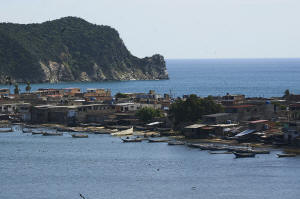US military strike off the coast of Venezuela disrupts life in
impoverished fishing communities
[September 20, 2025] By
REGINA GARCIA CANO
GÜIRIA, Venezuela (AP) — On Venezuela’s Paria Peninsula, an idyllic
stretch of Caribbean coast, it is an open secret that boats departing
from its ports transport both drugs and fish.
Residents claim not to know who owns the illegal cargo, but they can
tell when business is doing well because people eat out, get their hair
and nails done and buy expensive meat. They also admit that none of this
has happened since the U.S. military struck on one of those boats
earlier this month.
Few details are known about the deadly Sept. 2 strike on a boat the
Trump administration claims departed Venezuela carrying drugs and 11
members of the Tren de Aragua gang, fueling speculation. Fishermen in
the peninsula told The Associated Press they do not entirely blame those
who enter the illegal trade, as living off fishing alone in Venezuela
today is to accept a life of poverty.
Fishing boats in the breathtaking peninsula have been repurposed to
smuggle migrants, traffic humans, wildlife and fuel. These so-called
“other businesses” have flourished since Venezuela’s economic collapse a
decade ago.
“There is no revolution here,” said retiree Alberto Díaz, referring to
the self-described socialist movement that the late Hugo Chávez launched
in Venezuela in 1999 with the promise of improving the lives of the poor
using the country’s oil. “What there is here is hunger, sacrifice, pure
pain.”
Walking through the Güiria neighborhood of one of the strike’s victims,
Díaz lamented the decline of the local fishing industry, which once
offered jobs with living wages and a way for people “to be happy.”

Speculation abounds
Speculation over the strike is still going around Venezuela, with people
wondering who died and whether their deaths are part of a plan to topple
President Nicolás Maduro. Some have questioned their government’s
assertions that a video of the strike released by U.S. President Donald
Trump was created with artificial intelligence and that a boat of that
size cannot venture into the high seas.
But fishermen in the peninsula, who know their craft, immediately
recognized some characteristics of the boat from the video. They said it
was a 12-meter-long fishing boat known in Venezuela as “peñero” with
four powerful and expensive motors. They estimated the engines were at
least 200 horsepower each, a force five times more powerful than that
typically used on local peñeros.
“Fishing doesn't pay enough to buy a motor like that,” said fisherman
Junior González, taking a break from repairing a boat along the shore of
Guaca. Only a handful of roughly two dozen sardine processing plants
still operate in this community following years of overfishing, failed
restoration and the country's overarching crisis.
González explained that the motors he uses run between $4,000 and $5,000
each, while one of those needed to reach Trinidad and Tobago — the
suspected destination of the targeted boat — sell for $15,000 to
$20,000.
‘Small-scale traffickers’
The Trump administration has yet to explain how the military assessed
the boat’s cargo and determined the passengers’ alleged gang affiliation
before the attack. National security officials told members of Congress
last week that the boat was fired on multiple times after it had changed
course.
The strike, which followed a buildup of U.S. maritime forces in the
Caribbean, marked a paradigm shift in how the U.S. is willing to combat
drug trafficking in the Western Hemisphere. The U.S. military killed
three other people Monday after striking a second vessel that Trump said
was carrying drugs from Venezuela.
Interior Minister Diosdado Cabello has said authorities are
investigating the first strike but has not provided further details. He,
Maduro and other government officials have repeatedly said Venezuela is
not a key player in global drug trafficking.
[to top of second column] |

Boats are anchored off El Morro de Puerto Santo, on Venezuela's
Paria Peninsula, Sunday, Sept. 14, 2025. (AP Photo/Ariana Cubillos)
 Several fishermen and a local leader
who asked not to be identified for fear of retaliation from Maduro’s
government told AP the boat targeted on Sept. 2 departed Venezuela
from San Juan de Unare, another fishing community on the northern
coast of the peninsula. They said the men aboard hailed from that
town as well as Güiria.
While some fishermen supplement their income with drug trafficking
out of desperation, Christopher Sabatini, a research fellow at the
Chatham House in London, said the Trump administration “has
completely exaggerated” the scope of their illicit activities by
linking them to the Venezuelan Tren de Aragua gang and deeming them
an immediate threat to the U.S.
“If you look at (the boats), these could never make the journey all
the way up the Caribbean to the United States,” Sabatini said.
“These are small-scale fishermen — and now small-scale drug
traffickers — that don’t represent the crux of the issue.”
‘Everyone here knows what happened’
On Sunday, González, his father and siblings were the only fishermen
on the shore dotted by moored boats as recent policy changes have
restricted how often crews can fish for sardines. In communities
like Guaca and El Morro de Puerto Santo, the new rules could drop a
fisherman’s income below $100 a month, which isn’t enough to cover a
week of groceries under Venezuela’s current economy.
Drug running, in contrast, pays thousands at once.
“He doesn’t have food this week,” Kira Torres said, pointing to a
member of her husband’s fishing crew, which had returned to El Morro
de Puerto Santo last week without any sardines, so they earned no
money.
Torres said the community has ruling-party leaders who coordinate
the delivery of government subsidies, including food rations. Yet,
they have not received them in months.
She conceded that some fishermen in the peninsula turn to drug
running for “easy money,” but ultimately, they do it because they
have no other choice.
“Many make the mistake because they are in dire need,” Torres said,
pointing at reasons like hunger or having a sick relative. "Need
forces them to do anything, and since the government doesn’t come
here to help, what is one supposed to do?”
The impact of the illegal trade in parts of the peninsula is clear:
businesses quickly deduce a successful drug run when people suddenly
pay for goods and services with crisp U.S. dollar and euro bills.
They buy more than a handful of things at convenience stores and
treat themselves to a burger and fries.

Restaurant and bakery owner Jean Carlos Sucre has noticed this
pattern in Güiria and is worried about the future. He said the
recent U.S. strike has only worsened the “asphyxiating” conditions
already facing his business due to Venezuela’s soaring inflation —
leading to a significant drop in his weekly sales.
“Those who are working illegally aren’t setting sail for fear of
being caught by the gringos, I imagine,” Sucre said. “Everyone here
knows what happened, but very few talk. This week I sold 10
hamburgers out of the 90 I was selling (before the strike).”
All contents © copyright 2025 Associated Press. All rights reserved |